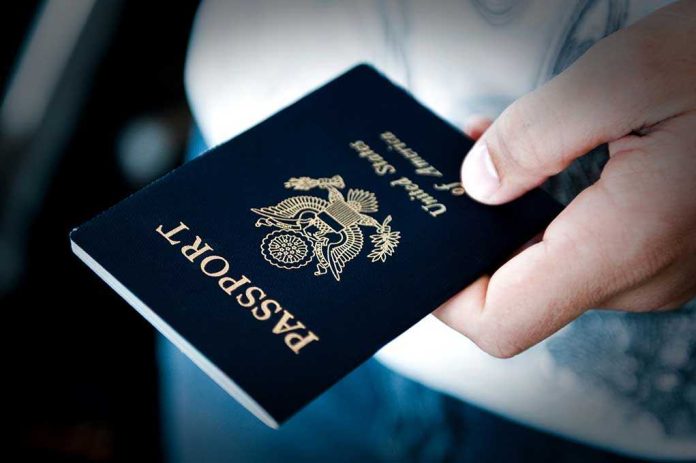
The Supreme Court just handed the Trump administration permission to enforce a passport policy that strips transgender Americans of their right to self-identify their sex on official travel documents, and the practical consequences are about to reshape how millions navigate international borders.
Quick Take
- Supreme Court stayed a preliminary injunction on November 6, 2025, allowing immediate enforcement of Trump’s biological sex passport requirement
- The policy mandates all new passports display biological sex at birth, eliminating previous options for self-identification including the “X” marker
- Transgender, nonbinary, and intersex Americans must now carry documents that do not reflect their lived identity, creating travel and safety complications
- The ACLU continues legal challenge, but the policy remains active during ongoing litigation, placing affected individuals in immediate jeopardy
What Just Happened in the Courts
On November 6, 2025, the Supreme Court granted the Trump administration’s emergency request to stay a preliminary injunction in the case Orr v. Trump, effectively removing the legal barrier that had temporarily blocked enforcement of the new passport policy. This decision allows the government to immediately begin requiring biological sex designation on all new passports, reversing years of federal practice that permitted individuals to select their sex marker or choose nonbinary options. The stay represents a significant judicial shift favoring executive authority over preliminary protections for individual rights.
The Policy’s Real-World Impact on Travelers
Transgender, nonbinary, and intersex Americans seeking new passports now face a stark reality: their documents will display biological sex regardless of their gender identity. This creates immediate practical obstacles for international travel. Individuals whose passport sex markers contradict their appearance may encounter heightened scrutiny at borders, visa applications, and security checkpoints. The policy forces affected individuals to carry documents that effectively out them as transgender to government officials and border agents in foreign countries, increasing vulnerability to harassment, discrimination, and potential violence in nations with hostile legal environments toward LGBTQ+ populations.
The Legal Challenge Continues
The ACLU’s legal team, led by Jon Davidson of the LGBTQ & HIV Project and Jessie Rossman of the ACLU of Massachusetts, characterized the Supreme Court decision as devastating. Davidson called it “a heartbreaking setback for the freedom of all people to be themselves,” while Rossman described the policy as “an unlawful attempt to dehumanize, humiliate, and endanger transgender, nonbinary, and intersex Americans.” The civil rights organization continues its constitutional challenge through the courts, but the policy now remains in effect during the litigation process, meaning affected individuals must navigate the system under the new requirements while their legal fight proceeds.
Why This Matters Beyond Travel Documents
This Supreme Court decision signals how the current conservative judicial majority views executive authority over identity documentation standards. The Court’s willingness to grant the stay suggests it believes the government’s interest in biological sex designation likely outweighs preliminary concerns about individual constitutional rights. If the policy ultimately survives legal challenge, it could establish precedent for other federal agencies to implement similar biological sex requirements across various identity documents and government systems, potentially influencing state-level policies as well.
The practical consequences extend beyond passport complications. International travel becomes fraught with risk for individuals whose documents do not match their presentation. Visa applications, hotel reservations, and border crossings all present potential flashpoints where mismatched identification creates friction and exposure. For transgender Americans planning to travel to countries with limited LGBTQ+ legal protections, the policy transforms a travel document into a liability that announces their status to foreign governments and officials.
The Constitutional Questions at Stake
This case fundamentally raises questions about the balance between executive branch authority to establish immigration and identity documentation standards and individual constitutional protections for marginalized communities. The Trump administration’s position emphasizes the government’s legitimate interest in establishing objective standards based on biological sex. The ACLU’s position asserts that forcing individuals to carry documents that contradict their identity violates constitutional rights and increases vulnerability to harm. This disagreement reflects deeper tensions about whether government identity documents should reflect biological characteristics or individual identity.
The litigation continues through the courts, but the immediate damage is already unfolding. Transgender Americans seeking new passports must now make difficult choices about whether to accept documents that misrepresent their identity or delay travel plans while their legal representatives fight for the right to self-identification on official documents. The Supreme Court’s decision allows this policy to take effect immediately, placing the burden on affected individuals rather than requiring the government to wait for a final legal determination before implementation.
Sources:
Supreme Court Opinion 25A319 Trump v. Orr (November 6, 2025)













